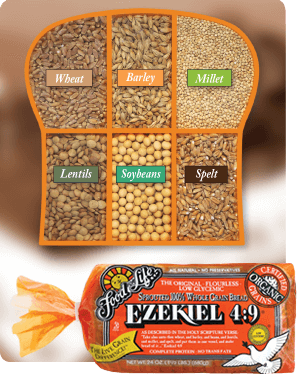Sessions Be-Fit | How I Make My Oatmeal
How Much Protein Do You Actually Need? (False Advertising)

Ever hear the saying, Too much of a good thing can be bad? Many of today’s nutrition recommendations are highly exaggerated to get into people’s pockets to make them buy more product, which leads to hurting your progress more than helping it. My biggest pet peeve is high protein diets. The fitness media brainwashes people into thinking they need 1.5 – 2+ grams of protein per pound of bodyweight. This would mean a 130lb person would need to consume 195 – 260g’s of protein per day, which is INSANE! If your goal is to lose weight, then I can understand the need for a high protein diet because protein is THE most satiating macronutrient and will keep you full so that you will not splurge on anything else, i.e. sugary carbs and unhealthy fats.
– What I recommend for fat loss is getting your body weight in protein per day. So if you weigh 135lbs you should aim to get 135 grams of protein per day. The satiating effect you get from protein is unreal. You will no longer have cravings for junk food and digesting protein alone will burn more calories since it takes longer to digest, hence why you will feel full longer between meals = less calories consumed throughout the day.
– Trying to build muscle? All you need is 0.7 – 0.8 grams per pound of bodyweight. So if you weigh 135lbs you would consume between 95 – 108 grams per day. The reasoning behind the lower intake for building muscle is because you need to leave room in you diet for healthy fats and carbs. As I stated earlier, protein is extremely satiating, so if you were to eat a bunch of protein you wont be hungry enough to get in essential fats and carbs. You need both protein, fats and carbs to build muscle. Protein itself is not some magical muscle building food source.
– Non active, sedentary individuals who want to live a normal healthy lifestyle should still be getting more than the RDA of 0.4 and get between 0.6 – 0.8 of protein per pound of bodyweight instead. The RDA of 0.4 is too low in my opinion because you will find yourself hungrier more often from the lack of protein.
How to Eat Based on Your Activity Level

Proteins, fats & carbs. Which is most important for us? All three of these macronutrients are important in our diet but the main question you need to ask yourself is how active am I? Sedentary individuals 👨💻 – protein & fat is your friend. I recommend 40% protein🥚, 40% fat🥜 and 20% carb🍊 – your cravings will slowly deteriorate 👌🏼. Being that you’re not physically active your body does not NEED carbs(glucose). Cross country/marathon runners 🏃 – 65-75% carb🍝, 15-20%🍗 protein and 5-15% fat🥑 – heavily relies on carbs for fast energy * fats and protein slow digestion. Lastly, average weightlifter 🏋🏻 who works out 3-5x’s per week and is lightly active outside the gym i.e. “me” – 25-35% protein🥚,25-35%fat🥑 and 25-35% carbs🍠 – an equal balance of everything.
How to Banish your Cravings!
Even if you don’t live an active lifestyle I still suggest getting at least 25-30 grams of protein in each one of your main meals along with a high fiber carb (bananas, berries, Ezekiel bread, brown rice, quinoa, oats) along with a moderate amount of healthy fat (egg yolks, almond butter/pb, almonds, walnuts, olive oil, avocado). Do not be shy with healthy fat🤨(along with protein, a fair amount of fat will prevent you from having cravings). I get at least 15 grams of fat every morning to stay full💪🏻. Macros for this meal: 32p, 50c, 15f 
Who ever Thought the two Words “Bread” and “Healthy” would ever go together?
 Next time you’re food shopping opt for this nutrient dense, sprouted grain bread. This bread contains all 9 essential amino acids that your body needs to repair and grow. Two slices of this bread gives you 8 grams of protein, 6 grams of fiber, 16% of your daily Vitamin B1 requirement(Thiamine), 16% of Phosphorus, 12% of Magnesium, 12% of Niacin, 8% of Vitamin B6, 8% of Iron and 8% of Zinc. Here I have listed the vitamins in this bread and how they play a role in your body:
Next time you’re food shopping opt for this nutrient dense, sprouted grain bread. This bread contains all 9 essential amino acids that your body needs to repair and grow. Two slices of this bread gives you 8 grams of protein, 6 grams of fiber, 16% of your daily Vitamin B1 requirement(Thiamine), 16% of Phosphorus, 12% of Magnesium, 12% of Niacin, 8% of Vitamin B6, 8% of Iron and 8% of Zinc. Here I have listed the vitamins in this bread and how they play a role in your body:
Thiamine – Helps the body convert carbohydrates into energy and helps metabolize(break down) fats and proteins (**plays same role as Niacin**).
Phosphorus – Helps build strong bones and teeth (much like Calcium).
Magnesium – Regulates muscle and nerve function (Especially important for exercisers), blood sugar regulation (great for diabetics), blood pressure, making protein, bones and DNA.
Vitamin B6 – Same role as Thiamine and Niacin except it helps the body make hormones such as Serotonin and Norepinephrine, which assists your body clock (when your body wakes up and when it winds down and sleeps).
Iron – Helps distribute oxygen and red blood cells from your lungs and throughout your body. Iron also improves energy, focus, gastrointestinal processes, your immune system and the regulation of your body temperature.
